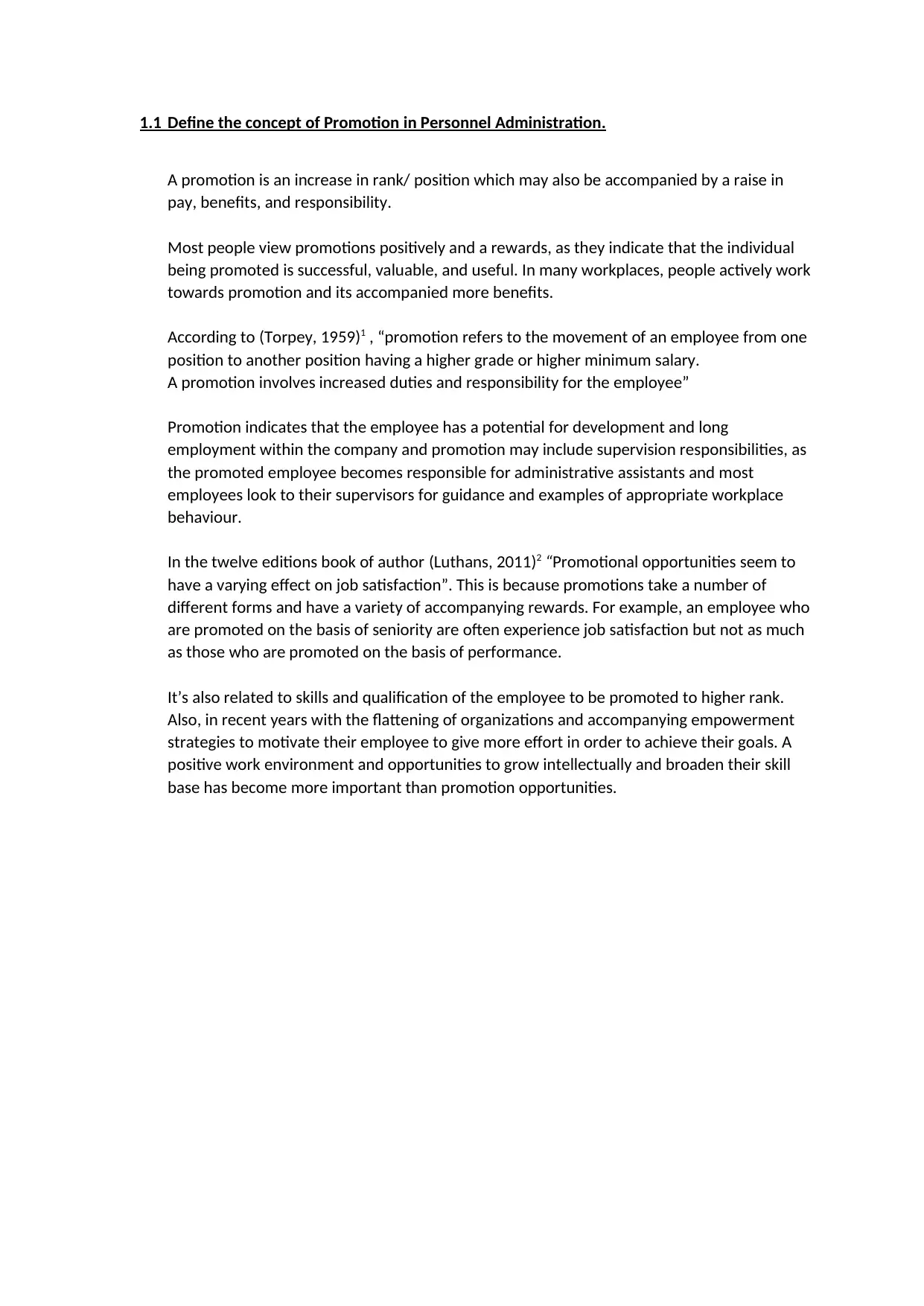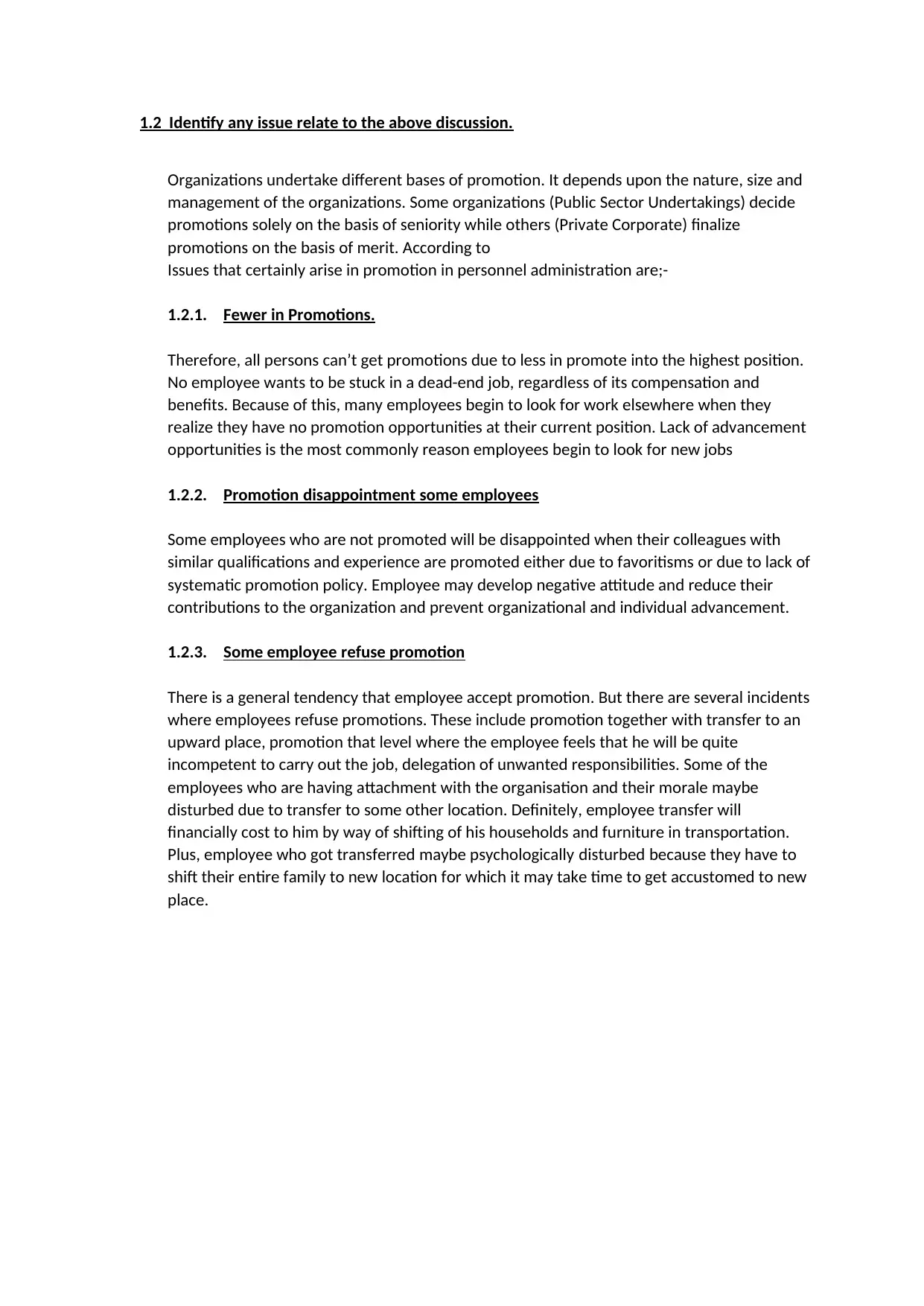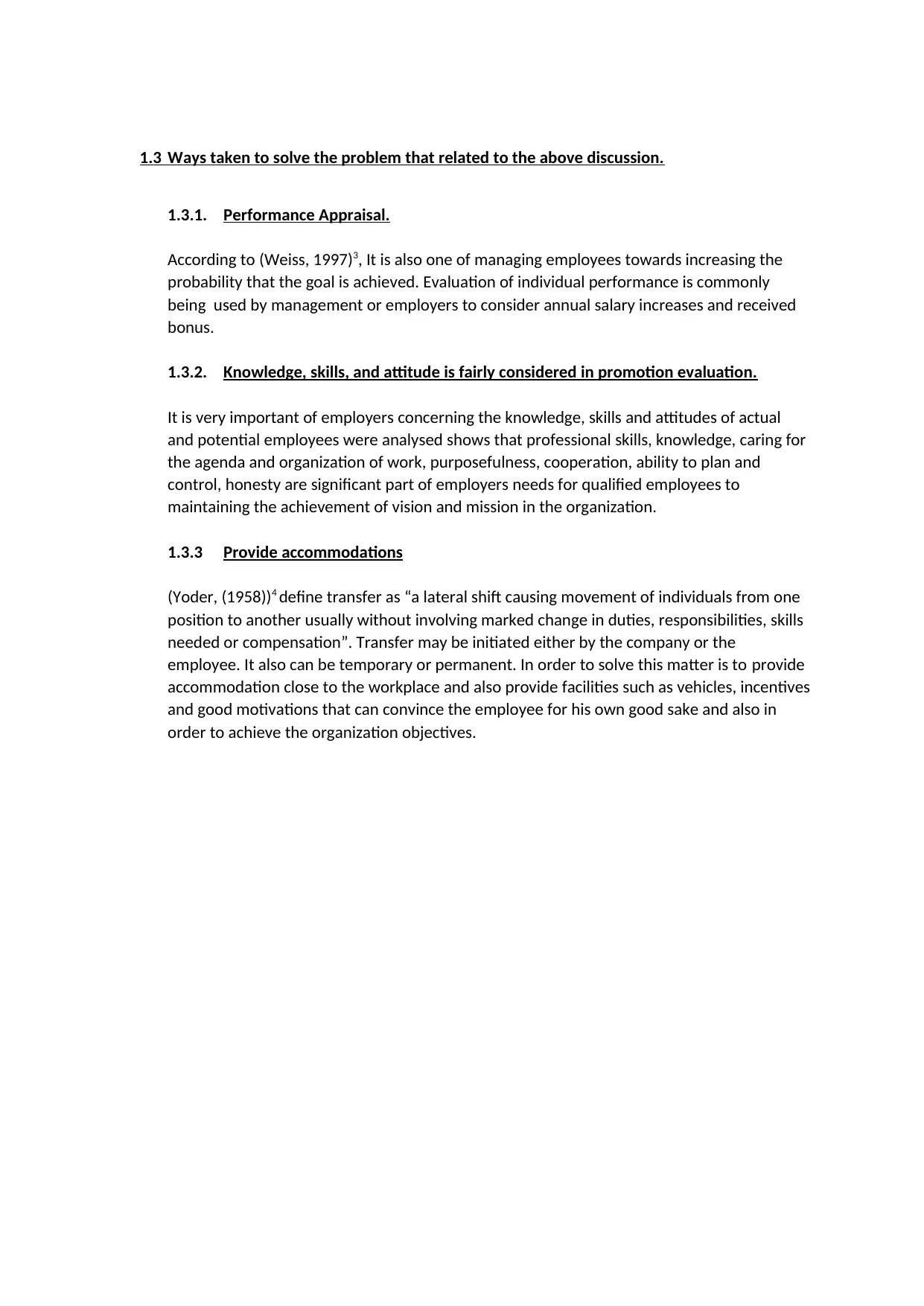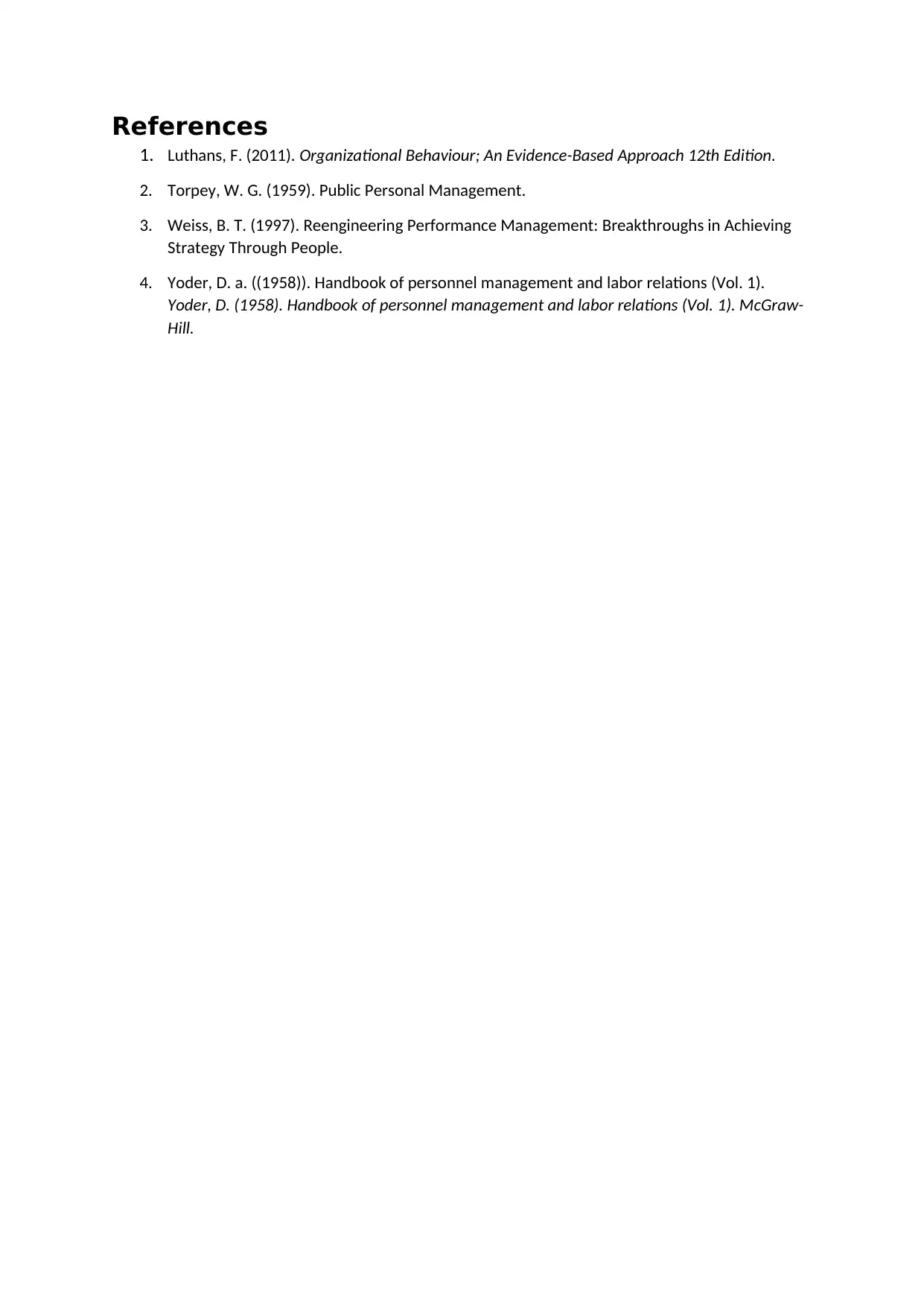Exploring Promotion in Personnel Administration: Issues and Solutions
VerifiedAdded on 2022/01/13
|4
|1019
|480
Homework Assignment
AI Summary
This assignment delves into the concept of promotion within personnel administration, defining it as an increase in rank, often accompanied by benefits and responsibilities. It explores various perspectives on promotion, including its impact on job satisfaction and the role of seniority versus performance-based advancements. The analysis identifies key issues such as limited promotion opportunities, disappointment among employees who are not promoted, and instances of employees refusing promotions due to factors like relocation or perceived incompetence. The assignment then proposes solutions, emphasizing performance appraisal, consideration of knowledge, skills, and attitudes in promotion evaluations, and providing accommodations like transfers to address employee concerns. The references cited provide additional context from relevant literature in the field of personnel management and organizational behavior.

1.1 Define the concept of Promotion in Personnel Administration.
A promotion is an increase in rank/ position which may also be accompanied by a raise in
pay, benefits, and responsibility.
Most people view promotions positively and a rewards, as they indicate that the individual
being promoted is successful, valuable, and useful. In many workplaces, people actively work
towards promotion and its accompanied more benefits.
According to (Torpey, 1959)1 , “promotion refers to the movement of an employee from one
position to another position having a higher grade or higher minimum salary.
A promotion involves increased duties and responsibility for the employee”
Promotion indicates that the employee has a potential for development and long
employment within the company and promotion may include supervision responsibilities, as
the promoted employee becomes responsible for administrative assistants and most
employees look to their supervisors for guidance and examples of appropriate workplace
behaviour.
In the twelve editions book of author (Luthans, 2011)2 “Promotional opportunities seem to
have a varying effect on job satisfaction”. This is because promotions take a number of
different forms and have a variety of accompanying rewards. For example, an employee who
are promoted on the basis of seniority are often experience job satisfaction but not as much
as those who are promoted on the basis of performance.
It’s also related to skills and qualification of the employee to be promoted to higher rank.
Also, in recent years with the flattening of organizations and accompanying empowerment
strategies to motivate their employee to give more effort in order to achieve their goals. A
positive work environment and opportunities to grow intellectually and broaden their skill
base has become more important than promotion opportunities.
A promotion is an increase in rank/ position which may also be accompanied by a raise in
pay, benefits, and responsibility.
Most people view promotions positively and a rewards, as they indicate that the individual
being promoted is successful, valuable, and useful. In many workplaces, people actively work
towards promotion and its accompanied more benefits.
According to (Torpey, 1959)1 , “promotion refers to the movement of an employee from one
position to another position having a higher grade or higher minimum salary.
A promotion involves increased duties and responsibility for the employee”
Promotion indicates that the employee has a potential for development and long
employment within the company and promotion may include supervision responsibilities, as
the promoted employee becomes responsible for administrative assistants and most
employees look to their supervisors for guidance and examples of appropriate workplace
behaviour.
In the twelve editions book of author (Luthans, 2011)2 “Promotional opportunities seem to
have a varying effect on job satisfaction”. This is because promotions take a number of
different forms and have a variety of accompanying rewards. For example, an employee who
are promoted on the basis of seniority are often experience job satisfaction but not as much
as those who are promoted on the basis of performance.
It’s also related to skills and qualification of the employee to be promoted to higher rank.
Also, in recent years with the flattening of organizations and accompanying empowerment
strategies to motivate their employee to give more effort in order to achieve their goals. A
positive work environment and opportunities to grow intellectually and broaden their skill
base has become more important than promotion opportunities.
Paraphrase This Document
Need a fresh take? Get an instant paraphrase of this document with our AI Paraphraser

1.2 Identify any issue relate to the above discussion.
Organizations undertake different bases of promotion. It depends upon the nature, size and
management of the organizations. Some organizations (Public Sector Undertakings) decide
promotions solely on the basis of seniority while others (Private Corporate) finalize
promotions on the basis of merit. According to
Issues that certainly arise in promotion in personnel administration are;-
1.2.1. Fewer in Promotions.
Therefore, all persons can’t get promotions due to less in promote into the highest position.
No employee wants to be stuck in a dead-end job, regardless of its compensation and
benefits. Because of this, many employees begin to look for work elsewhere when they
realize they have no promotion opportunities at their current position. Lack of advancement
opportunities is the most commonly reason employees begin to look for new jobs
1.2.2. Promotion disappointment some employees
Some employees who are not promoted will be disappointed when their colleagues with
similar qualifications and experience are promoted either due to favoritisms or due to lack of
systematic promotion policy. Employee may develop negative attitude and reduce their
contributions to the organization and prevent organizational and individual advancement.
1.2.3. Some employee refuse promotion
There is a general tendency that employee accept promotion. But there are several incidents
where employees refuse promotions. These include promotion together with transfer to an
upward place, promotion that level where the employee feels that he will be quite
incompetent to carry out the job, delegation of unwanted responsibilities. Some of the
employees who are having attachment with the organisation and their morale maybe
disturbed due to transfer to some other location. Definitely, employee transfer will
financially cost to him by way of shifting of his households and furniture in transportation.
Plus, employee who got transferred maybe psychologically disturbed because they have to
shift their entire family to new location for which it may take time to get accustomed to new
place.
Organizations undertake different bases of promotion. It depends upon the nature, size and
management of the organizations. Some organizations (Public Sector Undertakings) decide
promotions solely on the basis of seniority while others (Private Corporate) finalize
promotions on the basis of merit. According to
Issues that certainly arise in promotion in personnel administration are;-
1.2.1. Fewer in Promotions.
Therefore, all persons can’t get promotions due to less in promote into the highest position.
No employee wants to be stuck in a dead-end job, regardless of its compensation and
benefits. Because of this, many employees begin to look for work elsewhere when they
realize they have no promotion opportunities at their current position. Lack of advancement
opportunities is the most commonly reason employees begin to look for new jobs
1.2.2. Promotion disappointment some employees
Some employees who are not promoted will be disappointed when their colleagues with
similar qualifications and experience are promoted either due to favoritisms or due to lack of
systematic promotion policy. Employee may develop negative attitude and reduce their
contributions to the organization and prevent organizational and individual advancement.
1.2.3. Some employee refuse promotion
There is a general tendency that employee accept promotion. But there are several incidents
where employees refuse promotions. These include promotion together with transfer to an
upward place, promotion that level where the employee feels that he will be quite
incompetent to carry out the job, delegation of unwanted responsibilities. Some of the
employees who are having attachment with the organisation and their morale maybe
disturbed due to transfer to some other location. Definitely, employee transfer will
financially cost to him by way of shifting of his households and furniture in transportation.
Plus, employee who got transferred maybe psychologically disturbed because they have to
shift their entire family to new location for which it may take time to get accustomed to new
place.

1.3 Ways taken to solve the problem that related to the above discussion.
1.3.1. Performance Appraisal.
According to (Weiss, 1997)3, It is also one of managing employees towards increasing the
probability that the goal is achieved. Evaluation of individual performance is commonly
being used by management or employers to consider annual salary increases and received
bonus.
1.3.2. Knowledge, skills, and attitude is fairly considered in promotion evaluation.
It is very important of employers concerning the knowledge, skills and attitudes of actual
and potential employees were analysed shows that professional skills, knowledge, caring for
the agenda and organization of work, purposefulness, cooperation, ability to plan and
control, honesty are significant part of employers needs for qualified employees to
maintaining the achievement of vision and mission in the organization.
1.3.3 Provide accommodations
(Yoder, (1958))4 define transfer as “a lateral shift causing movement of individuals from one
position to another usually without involving marked change in duties, responsibilities, skills
needed or compensation”. Transfer may be initiated either by the company or the
employee. It also can be temporary or permanent. In order to solve this matter is to provide
accommodation close to the workplace and also provide facilities such as vehicles, incentives
and good motivations that can convince the employee for his own good sake and also in
order to achieve the organization objectives.
1.3.1. Performance Appraisal.
According to (Weiss, 1997)3, It is also one of managing employees towards increasing the
probability that the goal is achieved. Evaluation of individual performance is commonly
being used by management or employers to consider annual salary increases and received
bonus.
1.3.2. Knowledge, skills, and attitude is fairly considered in promotion evaluation.
It is very important of employers concerning the knowledge, skills and attitudes of actual
and potential employees were analysed shows that professional skills, knowledge, caring for
the agenda and organization of work, purposefulness, cooperation, ability to plan and
control, honesty are significant part of employers needs for qualified employees to
maintaining the achievement of vision and mission in the organization.
1.3.3 Provide accommodations
(Yoder, (1958))4 define transfer as “a lateral shift causing movement of individuals from one
position to another usually without involving marked change in duties, responsibilities, skills
needed or compensation”. Transfer may be initiated either by the company or the
employee. It also can be temporary or permanent. In order to solve this matter is to provide
accommodation close to the workplace and also provide facilities such as vehicles, incentives
and good motivations that can convince the employee for his own good sake and also in
order to achieve the organization objectives.
⊘ This is a preview!⊘
Do you want full access?
Subscribe today to unlock all pages.

Trusted by 1+ million students worldwide

References
1. Luthans, F. (2011). Organizational Behaviour; An Evidence-Based Approach 12th Edition.
2. Torpey, W. G. (1959). Public Personal Management.
3. Weiss, B. T. (1997). Reengineering Performance Management: Breakthroughs in Achieving
Strategy Through People.
4. Yoder, D. a. ((1958)). Handbook of personnel management and labor relations (Vol. 1).
Yoder, D. (1958). Handbook of personnel management and labor relations (Vol. 1). McGraw-
Hill.
1. Luthans, F. (2011). Organizational Behaviour; An Evidence-Based Approach 12th Edition.
2. Torpey, W. G. (1959). Public Personal Management.
3. Weiss, B. T. (1997). Reengineering Performance Management: Breakthroughs in Achieving
Strategy Through People.
4. Yoder, D. a. ((1958)). Handbook of personnel management and labor relations (Vol. 1).
Yoder, D. (1958). Handbook of personnel management and labor relations (Vol. 1). McGraw-
Hill.
1 out of 4
Related Documents
Your All-in-One AI-Powered Toolkit for Academic Success.
+13062052269
info@desklib.com
Available 24*7 on WhatsApp / Email
![[object Object]](/_next/static/media/star-bottom.7253800d.svg)
Unlock your academic potential
Copyright © 2020–2026 A2Z Services. All Rights Reserved. Developed and managed by ZUCOL.





